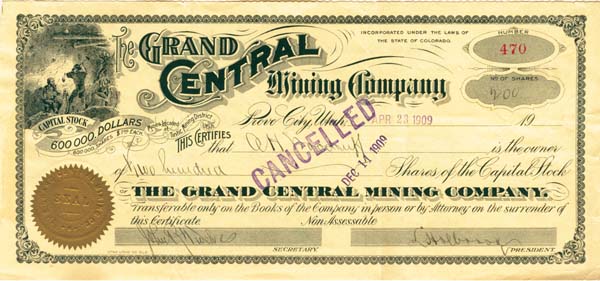Grand Central MIning Co. - Stock Certificate
Inv# MS1392 Stock
State(s):
Colorado
Utah
Utah
Years:
1909
Mines located at Tintic Mining District, Utah. Printer-Utah Litho Company.
Company took over the property of the Aravaipa Mining Company and operated a 140 ton flotation mill treating lead oxide ores at the Grand Central mine tailings. Head grade averaged 4.7 pounds lead, 3 ounces silver and 80 cents gold. Operations ceased in 1928 (Mines Handbook, 1931, p.324-325).
GRAND CENTRAL MINING CO. UTAH
Office: Provo, Utah. Mine office: Mammoth, Juab county, Utah.
Officers: Jos. T. Farrar, pres.; H. L. Holbrook. v. p.; Preston G. Peterson, sec.-treas.; Col. Edwin C. Loose, gen. mgr.; W. D. Loose, supt.
Inc. Feb., 1902, in Colorado. Cap., $600,000; increased 1909 from $250,- 000: shares $1 par. non-assessable; issued 600,000. Stock listed on Salt Lake Exchange.
Dividends: in 1914, 15c per share; in 1915, 2H-c; in 1916, 8c; in 1917, 16c : in 1918. 12c. Total dividends to 1919, $1,802,000. In April, 1919, 4c was paid.
Property: the Grand Central is the deepest mine of the Tintic district. It adjoins the Centennial Eureka and is opened to the 2,600' level, carrying a vein with an orebody 200' wide in places and of low average grade, though it is the largest orebody in the Tintic camp. A second ore shoot, 700' west of the old one, and with parallel strike, was opened on the 2,000' and 2,100* levels. This oreshoot averages 15 to 20% copper on the 2,380' level and has been opened up on the 1,600' level for a distance of 1,200', showing a width of 50 to 100". At this point the ore is bunchy, requiring careful sorting. Mine producing from the 4OO' to the 2,300' levels, inclusive.
Equipment: includes hoist, tramway and electric power. Mill to he constructed after the Knight Christensen plant has proved successful.
Production: 117 cars or about 5,500 tons ore in first quarter of 1919.
Property and management good.
A stock certificate is issued by businesses, usually companies. A stock is part of the permanent finance of a business. Normally, they are never repaid, and the investor can recover his/her money only by selling to another investor. Most stocks, or also called shares, earn dividends, at the business's discretion, depending on how well it has traded. A stockholder or shareholder is a part-owner of the business that issued the stock certificates.
Item ordered may not be exact piece shown. All original and authentic.









Ebay ID: labarre_galleries